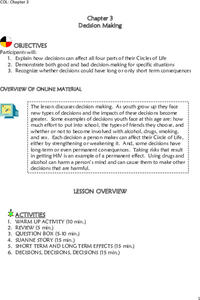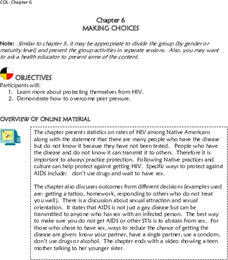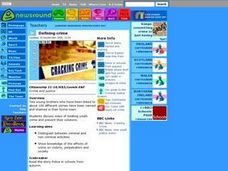US Department of Health and Human Services
Alcohol: Why Drink When You Can…
Prepare your learners to make good decisions about drinking by providing them with the real facts about alcohol and substance abuse. This resource includes several worksheets explaining how alcohol affects the brain, as well as a general...
Curated OER
Using Alcohol: Setting Limits
Students investigate how even low concentrations of alcohol affect a person's functioning. They examine alcohol-related risks affect both the individual and the public. They create a policy for alcohol use and defend its use.
Curated OER
Effects of Drugs and Alcohol
Students examine how drugs and alcohol impair athletic performance They discuss the reduction in aerobic activity through drug use and discover what is most affected by abuse. In their journals they write about how maintaining...
American Chemical Society
Why Does Water Dissolve Sugar?
Did you know that if you wait long enough, the M on the outside of an M and M will float to the surface when submerged in water? Learners observe the sugar coating of an M and M while it is dissolving in water. They explain how this...
Social Skills Central
Ready, Set, Respond!
When faced with a difficult situation, do you respond selfishly, face it head on, or ignore the problem? This game encourages learners to evaluate the wide range of reactions we can have to problematic situations, and how our responses...
National Institute on Drug Abuse
The Brain's Response to Drugs
Marijuana affects the brain differently than inhalants, which have a different effect than opioids. Elementary and middle school classes read about these drugs as well as nicotine, methamphetamine, hallucinogens, and steroids before...
Scholastic
Analyzing Media Messages
Telling young people to just say no can be difficult in a world that inundates them with messages to just say yes. A instructional activity on media messages encourages teenagers to analyze song lyrics and advertisements that mention...
Florida Department of Health
Understanding the Risk of Substance Abuse Unit
Teenage brains are different! Understanding that the teenage brain is still developing and thus more impacted by substance abuse is the key concept in a three-lesson high school health unit. Participants learn about how the brain and...
Healthy Native Youth
Chapter 3: Decision Making
By way of group discussion, reading, and role-play a series of six activities encourage scholars to make responsible decisions. Following an online introduction, pupils review the concept of volition and answer questions. Middle...
Healthy Native Youth
Chapter 6: Making Choices
A lesson looks closely at risky behavior such as teen pregnancy and sexually transmitted diseases. Middle schoolers use a question box to ask questions anonymously. They role-play what life would be like if they became pregnant then...
Curated OER
Crime and Young People
Students read the story, "Police in Schools". They view a list of common offences committed by young people and identify the victims of these offences and consider how the offence would affect those people.
Curated OER
Science In Society
Fifth graders study diseases that are related to the use of alcohol, tobacco, and drugs, both prescription and illegal. They determine illnesses that can occur as a direct result of the use of or inappropriate use of these substances....
Curated OER
The Sexual Response System
Students in upper-level sex education/family living classes study and discuss the stages of sexual response. As a group, they discuss possible real-life scenarios and the myths and misconceptions which can affect the functioning of the...
Curated OER
Discernment
Middle schoolers are encouraged to have a sense of the importance of being able to make wise choices. They discuss alcohol abuse and crime and safety. Students comprehend the nature and consequences of anti-social behaviour. They...
American Chemical Society
Surface Tension
A drop of dew holds a sphere shape even when sitting on a seat thanks to the surface tension of water. Learners observe the phenomena of surface tension in water. Through demonstrations, hands-on activities, and discussions they explore...
Heritage Foundation
The Amendment Process and the Bill of Rights
Did you know that lawmakers have proposed more than 5,000 bills to amend the US Constitution in Congress? Your class learns intriguing facts about the process of choosing amendments. A variety of activities including before and after...
PBS
Stories of Painkiller Addiction: Contemplating Nature vs. Nurture
Does having an addict in your family make it more likely to become one yourself? Explore the genetic risk factors, as well as the prominent environmental influences, for substance addiction in a lesson that encourages awareness and open...
Curated OER
Beethoven: The Sound and The Fury
Students view a documentary on Beethoven. His immortal compositions have survived for generations and are as much a part of the modern world as they were almost two centuries ago. After viewing, students discuss Beethoven and compare him...
Curated OER
Heart 2: Changing Lifestyles and Heart Health
Students examine and evaluate changes in diet and lifestyle from prehistoric to modern times and how these differences have spurred the development (and better treatment) of heart disease.
Curated OER
Dying to Breathe
Students consider some of the criteria involved in selecting organ recipients. They are given a copy of "You Be the Judge." Students are divided into four "Transplant Review Boards." After each group has chosen its lung recipient,...
Curated OER
Real Attractive
Sixth graders create a collage of attractive people. They write about what makes these people attractive. They discuss what makes someone attractive. They research eating disorders and how the media impacts what people deem as attractive.
Curated OER
What Increases the Risk of Cardiovascular Disease?
Learners analyze the risk factors for cardiovascular disease and classify them according to whether or not they are controllable. They discover how to reduce the probability of high blood pressure through diet and exercise.
Curated OER
Committing crime or just having fun?
Students estimate the number of beans that is placed in a bottle. They are then split into three groups: Group 1: asked to write estimate on a sheet of paper with some large estimates already written down, Group 2: asked to write their...
Curated OER
Life Skills for Vocational Success: Transportation, Owning a Car; Topic 5: Legal Issues
Students discuss auto accidents and ways to avoid them. They listen as the teacher lectures about what to do in case of an accident. Students discuss traffic violations and reasons to be aware of them. They generate a list of violations...

























